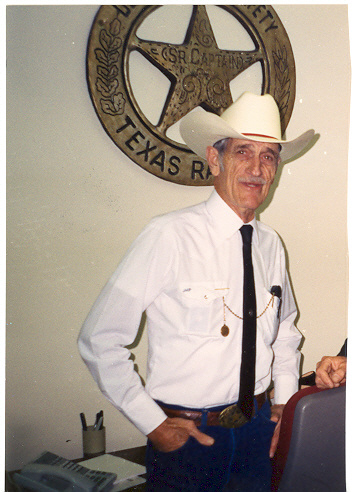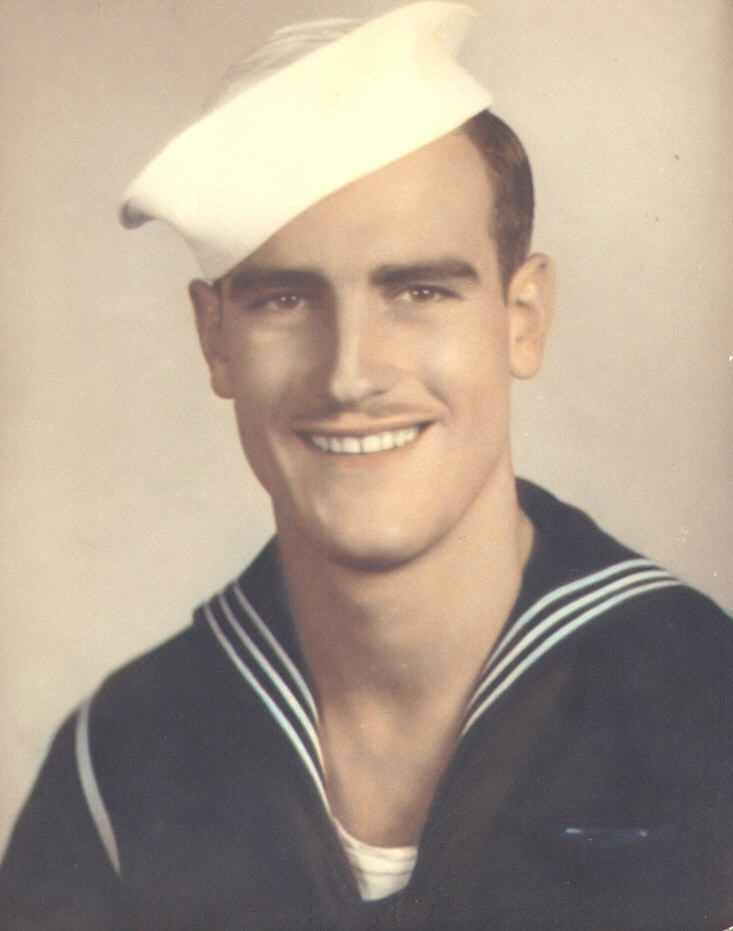TRANSCRIPTION
How old were you when you entered the service?
I would say 18, right out of high school. My mother and dad said, German dad said, no son you only got five more months to May of forty two when you graduate, then we will sign anything you want to join. I went in, lighter part of '42, Dec of forty two that is when it was.
Were you married or anything at the time that you entered the service and the war?
No, I had high school sweetheart I took down to the remuda and that's her right there (his wife sitting next to him) wife says, " and it is fifty eight years yesterday".
Where did you go when you entered the service?
I went to the naval air court training at the University of Texas, V5 program they called it. When you got threw that you were a naval flyer, and it was about a 13-month course, flight preparatory. There were Three different stages, and every time we were beginning to win a few scrimmages out in the South Pacific they would add another school on, and I was in the 42nd battalion, no the 39th battalion at the University of Georgia navy pre-flight school and I got this knee busted at navy prep-school.
(Mr. Preiss was telling me a story before I asked another question and he went on to say. While he was in Georgia at the Naval school, he was playing football. He got his knee hurt and he had to have surgery on it. When this was happening he was in the 39th battalion, but when he had to have surgery it knocked him back to the 42nd battalion. He went on to say that, two buddies of his went on in the 39th battalion and they went to the Battle of lady Gulf, which was a battle that the United states got beat up and had many casualties. So he always thinks to himself that knee injury might have kept him alive. He said that is when the Japs came out with their Kamikaze suicide attacks and they hit the carrier that he had been on three different time but they didn't sink it, but set it afire pretty good.)
What was going on in the war when you entered?
We were on are way over there, when as known as the Big strike or whatever they call it. When the Americans were going to make landfall on the Japanese Empire. Our whole United States fleet was in Tokyo Bay in 45', I mean before 45', the Battle of lady gulf was in Dec. of 44' so we were hopping. About that time, Truman, Bless him (salutes as he says this) I salute every time I take my hat off when I salute when I say Harry Truman. That is what are squadron went over there for, we were island hopping, that is when right after Truman gave the go on the Enola Gay and the Boxcars B-29's to drop the biggees down the smokestacks at Nagasaki and Hiroshima. Well uh like I say I salute Harry Truman, if he hadn't done that, when they hit Nagasaki and Hiroshima it could of been really bad. Within a month, the peace treaty was being signed.
How did it affect your family when you went to war?
Well, it was just such a thing; people were so patriotic at that time after that Pearl Harbor thing. My dad was ready, if he could of he would of gone, that Dutchman was pissed. He said I want you to finish high school; I want you to get that paper. Mom and I are not against you going if you want to go now with your buddies. But several had quit to go, one had quit, several had quit from Brackenridge. That is where I went to high school and I had a high school sweetheart, that is another thing that kept me from going and I wasn't too eager to go and ready to go fight.
What is one of your fondest memories of World War Two?
I remember one time I was flying with my flight instructor, this was before I entered the war. Well he would cut the power on the plane, then you would have to look for a force landing. We were out in dairy country in Wisconsin, a lot big dairies, big black and white cows, holsteins. I picked a field, I figured I could set it down, and all we had to do was almost touch and the pull up real quick and take off again. Well the plain I was flying was sluggish, I should of never accepted when we left there, it popped black smoke in my face when I started it up, it was running to rich. When I came down, the railroads were built up high because it's all flat land up there, the tracks were as high as this ceiling here. I was going in and I slipped that thing in sideways and lose altitude and pulled me out of the slip and I came down right over high waters, and I saw him in my mirror. He looked back and he was afraid I was going to hang that rear wheel on that high wire. He was a gutless one, anyways, I knew I had to cut it pretty close to past that high line and get enough room with how that plane preformed to get out of that field. Then I realized there was a dairy out there and it was about 4 or 4:30 and I saw all those cows lined up to get onto that milker. We were kind of frowned on if we flew to low, and if they could get a number, those dairy farmers would calling that number into the base all the time. I had to scare him a little bit and I got in there and I knew I had to have a certain air speed to take off and to get that air speed I knew I had to work at it cause it was flying right. That was dairy barn was coming and at the last minute I pulled her off and over the top of that dairy barn and I looked back and all those cows were running out of that barn. I imagine they didn't get any milk that day (he laughs as he says that).
Do you think that the veterans then and now are being treating with the respect that they deserve?
I think they get respect but not what they deserve. I think after Vietnam, they lost a lot of respect. We should have never even been there, that was a big mistake sending are troops over and having to deal with all of that. But, mostly today it is all politics and that takes over everything and the veterans don't get the full respect that they deserve.

ANALYSIS
One of the main things that I learned from doing this interview was that, you look at history in a different way when someone that actually lived threw it tells you the stories that he has experienced. It is so much more interesting to hear in person then actually read it from a book. A book doesn't have the feelings and emotions that the person you are hearing it from does, which makes it so much better and you yourself stays more in attention to that person. I learned that he has seen many things in his lifetime. He was telling me about when they caught Bonnie and Clyde and he was telling me that it happened and he went and saw the car they were captured in. He went and saw it in San Antonio, it was at one of the Museums and he told me he knew it was the real car because he could see all the blood and stains left from Bonnie and Clyde inside the car.
Mr. Preiss was telling me about his father saying that he would let him go as soon as he got his diploma from high school. He said that everybody in the United States was furious after Pearl Harbor, his father would of gone to war if he could of, the patriotism at that time was unbelievable. It made me think about 9-11 and that it was probably something like that in some ways. It is sad to say but sometimes a country needs something awful to happen to bring the country itself back together and stop all of the hate and look at your neighbor in kindness.
There are some benefits and some drawbacks to coming with an oral history. Some of the benefits are, such as you get a better perspective and close up feeling of how it was and how the people reacted at that time. Some of the drawbacks are, such as you might not get more of a factual history. Meaning, you won't get more dates and names of people of events that might of taken place at that time because the person you are interviewing might be telling more stories than anything else.
I believe this is an effective way of learning the past, because you are more able to see what the history is really like and not read it out of textbooks that might have the factual history, but you don't get the guts of the history. Which sometimes is more unrated, but it is sometimes what you need to see and feel what history is like during those time.
POSTSCRIPT
Jerome Herbert Preiss died on July 12, 2004 at the age of eighty.
ANNOTATED BIBLIOGRAPHY
Return to Oral History Projects

